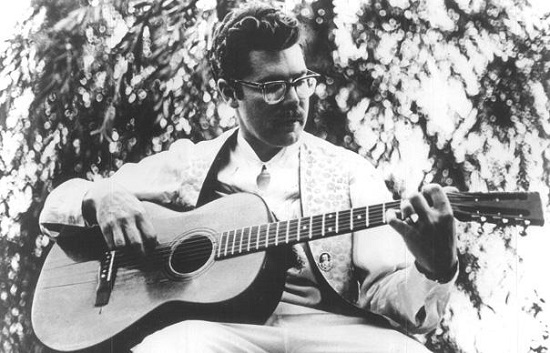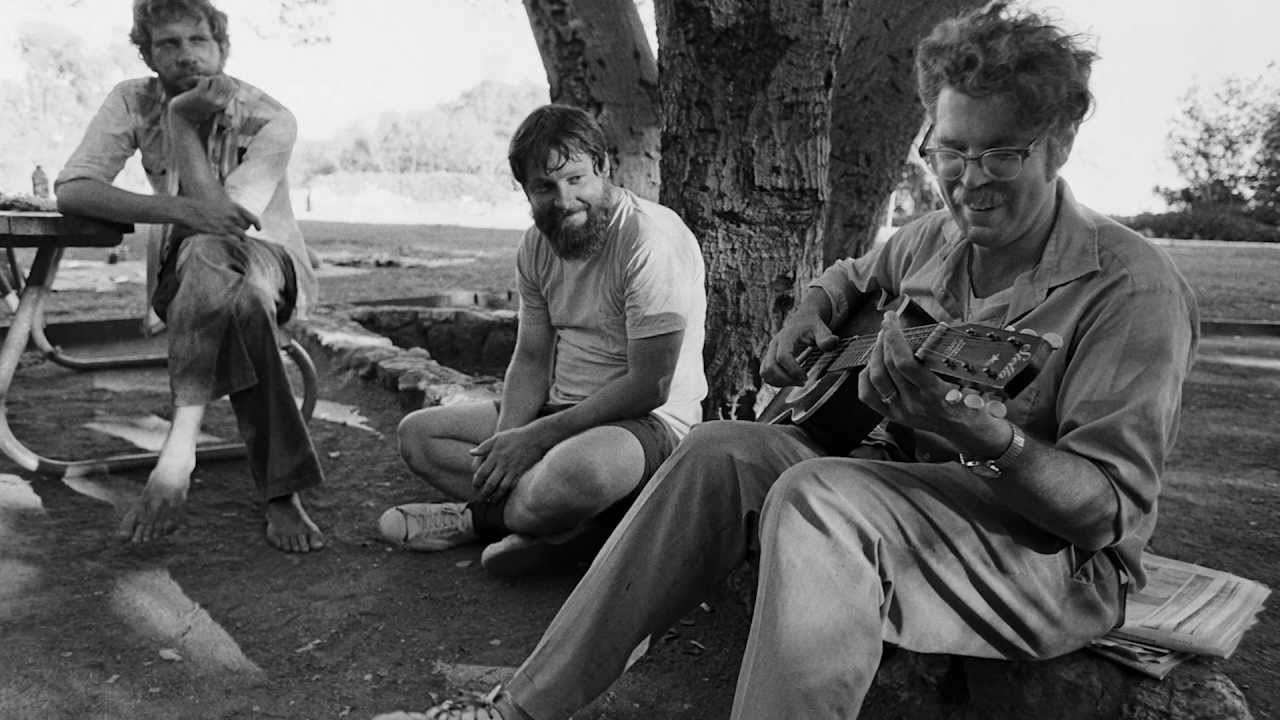Forget Gram Parsons and Gene Clark – Robbie Basho is the true voice of Cosmic Americana.
It is puzzling why the why the legacy of this unparalleled innovator of the acoustic guitar has fared so poorly in comparison to his label boss – the more popular and fashionable John Fahey. Whilst Fahey continues to project an inscrutably cool, sardonic air through his steel-string subversions of American folk-blues, Basho comes to us all open-hearted joy and sincere, religious conviction. I’d argue it is our culture’s general unease with all of these latter qualities that has acted to the detriment of the reach of his fandom. He was a guitarist of unparalleled innovation who alchemically combined elements of Indian, East Asian, British and various other folk musics to create near-symphonic odes to the American West and the human soul. In its valiant attempt and ultimate failure to get right to the heart of this baffling and beguiling musician, Liam Barker’s documentary Voice Of The Eagle: The Enigma Of Robbie Basho will do a lot to redress this critical imbalance.
Formed mainly from the video testimonials of the few people that knew Basho at all – his adopted family, a smattering of fellow musicians, the students he taught guitar and his religious associates – the film reveals details of his life and lifestyle unknown to the vast proportion of his followers. Perhaps tellingly it is the acquaintances he met through religious avenues, namely the members of the California sect Sufi Reoriented, that feature most prominently, illustrating in itself Basho’s deep and abiding commitment to spiritual enquiry. Conversely, Basho’s status as an outlier guitarist is made self-evident in the interviews with his contemporary musicians. There are some rather questionable comments from Pete Townshend – American Primitive enthusiast and also a follower of Basho’s spiritual leader Meher Baba (“I’m very influenced by Basho’s playing, you can hear it in my work”), whilst countercultural icon Country Joe MacDonald seem barely able to remember anything about his meetings with Basho. It seems that temporal distance was required for his genius to be truly appreciated, as is seen in the words of more recent musicians – Glenn Jones comes off as a veritable Basho scholar, whilst Steffen Basho-Junghans swears by some form of metaphysical connection with the late guitarist.
Liam Barker’s status as a new filmmaker primarily interested in fiction shines through in this feature. With the relatively scant materials he has to work with, he does an excellent job of shaping a narrative out of the eclectic testimonials. Similarly his cinematic depictions of the American wilds betray his deep love for and understanding of Basho’s music. Majestic depictions of the native landscape, flora and fauna are lyrically wed to the sound of Basho’s singing and playing, and it’s at these moments when he feels closest.
Perhaps most surprising is the film’s exploration of Basho’s darker side. Often a cliche of music documentaries, it comes as a surprise to hear of the guitarist, fond of wearing suits, meditation, and with a face rather like Ned Flanders’, struggling with mental health issues and demonic visitations. To hear Basho’s voice soaring above his cathedral-like vistas of chiming 12-string guitar – literally the sound of a soul ascending – it’s hard to imagine the very basic, very human pains behind the man that this documentary touches on. Yet for all his eccentric codes of conduct and his Orientalist fascination with etiquette and self-discipline, those perennial problems still force their way to the surface: loneliness, the feeling of being born out of time, problems with drugs.
Yet whilst these moments of personal insight are illuminating, the film ultimately struggles to paint a definitive picture of this unusual and private man. There are very few interviews with Basho himself available in the public sphere, and likewise there are only three videos of him playing in existence. From the various interviews in this documentary we can see that Basho’s idiosyncrasies left a mark on all who he met, but he allowed very few people to get close to him. Understandably then, Barker’s documentary lives up to its title. Whilst Voice Of The Eagle undoubtably creates a clearer image of Robbie Basho than we’ve ever had before, in the end he remains precisely that: an enigma. But like Basho’s music, its a mystery you’ll enjoy getting lost in.



